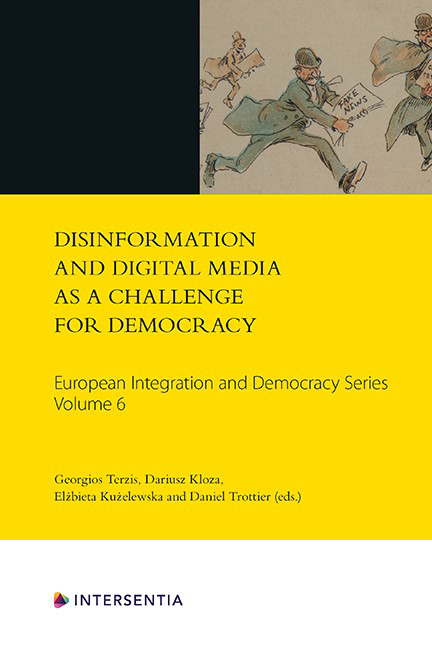Book contents
- Frontmatter
- Foreword: Fooling All of the People All of the Time: Democracy in the Age of Fake News
- Introduction: ‘They All Hear “Ping” at the Same Time’
- Contents
- List of Abbreviations
- List of Contributors
- PART I THEORETICAL APPROACHES TO AND THE CONCEPTUALISATION OF DISINFORMATION
- PART II EXPERIENCE OF DEALING WITH DISINFORMATION
- PART III SOLUTIONS TO DEAL WITH DISINFORMATION AND THEIR CRITIQUE
17 - The War against Fake News in the Digital Age and the Weapons in Our Intellectual Arsenal
Published online by Cambridge University Press: 26 May 2021
- Frontmatter
- Foreword: Fooling All of the People All of the Time: Democracy in the Age of Fake News
- Introduction: ‘They All Hear “Ping” at the Same Time’
- Contents
- List of Abbreviations
- List of Contributors
- PART I THEORETICAL APPROACHES TO AND THE CONCEPTUALISATION OF DISINFORMATION
- PART II EXPERIENCE OF DEALING WITH DISINFORMATION
- PART III SOLUTIONS TO DEAL WITH DISINFORMATION AND THEIR CRITIQUE
Summary
INTRODUCTION
If we want to properly discuss the topic of fake news, we first need to understand the difference between printed and digital media. In the era before the Internet, in order to launch and, most importantly, maintain a sustainable and profitable news organisation, substantial financial and social capital was required. As a result, the number of news outlets (and thus the sources of information) was limited. There were of course small, local newspapers and television stations, but these attracted only a tiny portion of the total audience.
The development and widespread availability of the Internet in the past two decades spearheaded a new era of information, bringing about a fundamental change in the way we consume news – unparalleled access to a variety of opinions and perspectives, as well as an unprecedented ability for every citizen to become both a consumer and a distributor of information. This meant that a variety of independent news outlets began to pop up in the form of amateur blogs and later as social media pages.
The problem quickly became apparent. On the one hand, this new, faster and unrestrained access to information was a powerful and extremely useful tool that had the potential to improve people's everyday life as well as improve the speed of information exchange in the field of scientific research. However, on the other hand, this access also gave everyone the ability to write and share anything they wanted through social media without even a moderate form of content review.
There is a clear distinction between news and opinion, and this line is set by journalists’ commitment to facts and impartial analysis of any given claim. Without this mindset, journalism is nothing short of gossiping. Yet, the average citizen is not a trained journalist; therefore, they have probably not invested time and energy into learning how to assess the validity of any given news article. This leaves us with millions of people who have appointed themselves as journalists, constantly sharing and, more often than not, writing news articles of questionable accuracy. This situation has, in part, given rise to the problem of fake news in the form we see today.
- Type
- Chapter
- Information
- Disinformation and Digital Media as a Challenge for Democracy , pp. 327 - 340Publisher: IntersentiaPrint publication year: 2020



